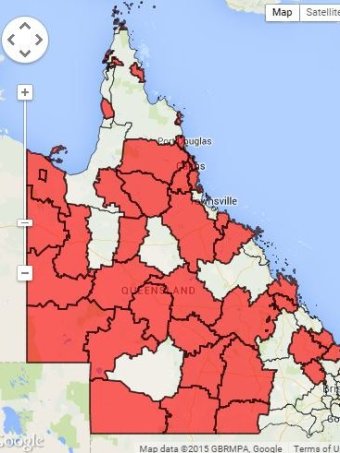Since the fluoridation of water was made optional in Queensland, coverage of the state’s population has dropped by 10 per cent, and just one Indigenous council is fluoridating its supply.
Aurukun on Cape York switched on its fluoridation plant earlier this year and is taking advantage of State Government grants to meet its costs.
But it stands alone among Indigenous councils, with the exception of Kowanyama where there are naturally high levels of fluoride in the water.
The Australian Dental Association Queensland [ADAQ] said it was a worryingly low take up.
“In general there is a greater degree of decay in the Indigenous communities,” ADAQ executive officer Dr Ian Meyer said.
“It’s a big concern because we want our individuals who are at greatest risk to get the biggest benefit.”
Of the 77 councils in Queensland, only 26 fluoridate some or all of its water supply.
Albeit most of the large south-east councils, including Brisbane, Ipswich, Logan, the Gold Coast and Sunshine Coast, fluoridate.
Three councils – McKinlay, Kowanyama and Quilpie – have naturally occurring fluoride, meaning adding more is not necessary, leaving 48 which do not fluoridate at all.
They include Cairns, Rockhampton, Bundaberg and Fraser Coast and represent roughly 800,000 people and more than 40 per cent of Queensland’s Indigenous population.
Queensland’s chief dental officer Dr Mark Brown was disappointed state coverage had dropped back but respected the decision of local councils.
“I’m hopeful as councils review from time to time that they’ll make the decision to fluoridate their water supplies,” he said.
Premier will not force the issue
Queensland was late to water fluoridation.
While the rest of the country introduced it in the 50s and 60s, it was not until 2007 that Labor announced it would be made mandatory for any town with a population of more than 1,000 people.
My government is a government of consensus.
Premier Annastacia Palaszczuk
The LNP in 2012 then made it optional.
Despite now Premier Annastacia Palszczuk slamming the decision at the time as “allowing these councils to take Queensland backwards”, she will not commit to reversing it.
“My government is a government of consensus,” she said.
“We’re prepared to give as much information as possible but we want to take councils with us.
“We know the benefits and perhaps it’s more about raising awareness with councils the benefits of fluoride to take people with us on that journey.”
Minority government afraid to change health policy
Political scientist Paul Williams believed health policy had given way to the hard-nosed politics of being in minority government where one by-election could change the government.
“I think it’s very much about regional politics in Queensland,” he said.
“We all know you can’t govern the state from Brisbane.
“The regional cities, the towns – they’re the tail that wags the state dog as it were.
“And I think that the Palaszczuk Government, which is already in a very precarious position, is being risk averse and doesn’t want to risk an unnecessary backlash that could destabilise an already precarious government.”

